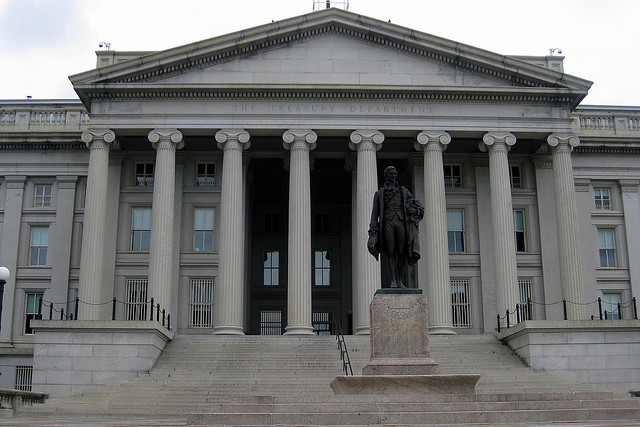Further discretionary spending cuts unnecessary to address federal debt
This post contributed by Terence Houston, ESA Science Policy Analyst
While the taxation aspect of the fiscal cliff may have been averted, budget sequestration was merely punted until March 1, which means funding for federal agencies responsible for science and environmental initiatives remain at risk unless Congress can come up with a plan to reduce the debt by $1.2 trillion before then. The across-the-board indiscriminate cuts to discretionary spending would have multifaceted impacts. There is also the issue of potentially defaulting on the national debt, the consequences of which could prove disastrous for the economy. Congress recently took action to temporarily avert these consequences until such time as a deal can be reached on sequestration (hopefully).
Prior to the fiscal cliff deal, the White House had released a report outlining how funding levels for federal agencies (including science agencies) would be impacted under sequestration. As noted in a recent letter sent by scientific societies to the president and congressional leaders, hindering investment in science puts our nation’s overall global competitiveness at risk. Further, the Wilderness Society last year compiled a report outlining sequestration’s impacts on federal conservation efforts, which include endangering public safety at national public parks. Given that we will be five months into Fiscal Year 2013 (which started Oct. 1, 2012) by the time these cuts would be made, their impact would likely be even more severe than they would have been, had they been implemented in January.
As numerous reports have relayed, discretionary spending is not the root cause of our national debt. Indeed, these massive cuts to critical discretionary spending would do nothing to stem the nation’s growing debt. The Bipartisan Policy Center (BPC) notes that overall discretionary spending is already on the decline (partially attributable to the spending caps outlined in the Budget Control Act (BCA)) and that meaningful debt reduction must address “health care inflation, the retirement of the baby boomers, and an inefficient tax code that raises too little revenue.” BPC has even gone as far as stating that restraining defense and non-defense discretionary spending is “the one issue that Congress has fully addressed,” which could be taken to mean that further discretionary spending cuts would go further than BPC deems necessary (and with little impact on the debt). BPC also agrees that the initial discretionary spending savings of $840 billion ($920 billion with interest included) under the BCA are similar to what was recommended under the National Commission on Fiscal Responsibility and Reform, commonly known as Simpson-Bowles.
According to a summary draft of the Simpson-Bowles plan, implementation of their recommendations for reducing tax expenditures ($751 billion) and cutting mandatory spending ($733 billion) would total more than $1.4 trillion in deficit reduction (more than the $1.2 trillion necessary to avert sequestration). Coupling the total discretionary and revenue savings enacted to date since publication of Simpson-Bowles under the Budget Control Act, the American Taxpayer Relief Act (which included an estimated $600 billion in deficit reduction through revenue) and the recommended tax and entitlement reforms would equal the nearly $3.8 trillion in savings Simpson-Bowles recommends as necessary to stabilize the debt.
Nonetheless, Congress has yet to take on entitlement spending or tax loopholes in a significant way. The only proposals to mandatory spending put forward have targeted programs geared toward the least fortunate in direct contradiction of recommendations from the bipartisan Simpson-Bowles commission: “About 20 percent of mandatory spending is devoted to income support programs for the most disadvantaged. These include programs such as unemployment compensation, food stamps, and Supplemental Security Income (SSI). These programs provide vital means of support for the disadvantaged, and this report does not recommend any fundamental policy changes to these programs.”
To be sure, tackling the burgeoning federal deficit, as BPC notes, is essential to sustaining the overall health of the American economy long-term. Nonetheless, sustaining the nation’s science capacity and environmental programs requires policymakers to muster the courage to shift gears towards the more politically risky deficit reduction methods it has not yet addressed.
Photo credit: wallyg
